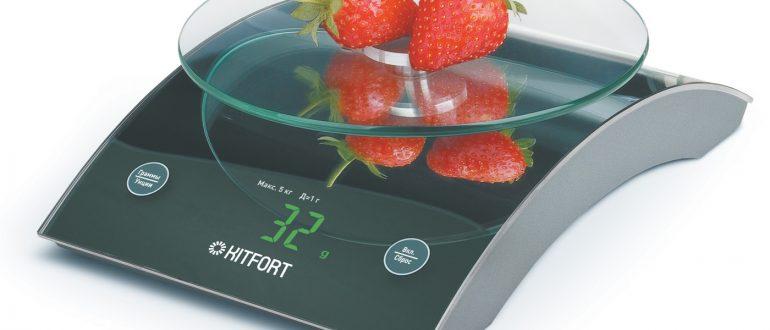At first glance, the problem of how to choose a kitchen scale is not particularly difficult, especially for those who rarely use this household appliance in everyday use. They are needed in cases where the preparation of a new dish requires precision in the investment of products, or when an inexperienced housewife cannot use the already acquired skills of working with folk measuring instruments - by eye, half a spoon, a pinch, a handful.
But upon closer examination, it turns out that a kitchen scale is a necessary thing in the household. Compliance with the exact dosage improves the taste of the cooked food, you can check the integrity of the store or seller in the market, additional options and modern design optimize the productivity of the kitchen.
Content
Common types of kitchen scales
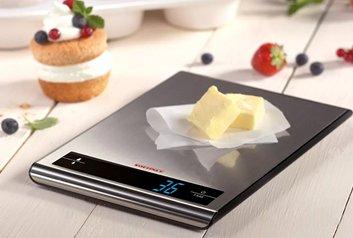
More and more housewives consider food scales to be a necessary item in the kitchen, and modern industry is sensitive to the increased consumer demand. To the uninitiated. it is difficult for a person, especially a woman, to understand the advantages and disadvantages of the devices offered by the manufacturer.
After all, products are manufactured not only with different mechanisms, information indicators and the principle of operation, but also with variable sizes, principles of weight measurement, design and equipment. The main thing that should be decided first of all is their type. After all, each user has his own priorities and concepts about which view he considers more accurate and practical to use.
Different principles of operation and devices of kitchen scales
Do not think that floor and kitchen scales differ significantly. After all, both are designed to determine weight. The former weigh a person and need less precision - the count goes to kilograms and grams, and the size is more significant, because the object to be measured is large enough. Veins for products are much smaller in size, but they are also designed to be weighed in grams, often a kilogram is the last figure on the scale. However, the determination of the required exact numbers still occurs according to the same principles - in an electronic and mechanical measuring device.
Electronic balance
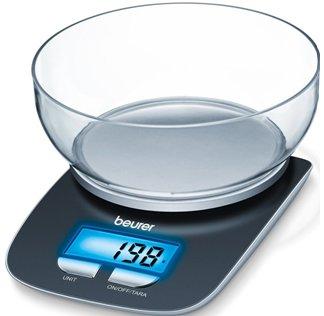
They work with a strain gauge located inside the device. The vibrations of the platform caused by the pressure of the product located on it are read by a cunning device capable of converting them into an electrical impulse, and a special electronic central board decrypts the received data. A person does not make any effort either to obtain (except for the acquisition of a battery inserted into the scales), or to decipher the indicators that are displayed on a digital board or an informative display. They go there automatically, after the board has perceived the electrical signal and converted it into visual digital information.
The accuracy of instruments with an electronic measuring system can reach 0.1 g, they are usually small and flat, and many manufacturers effectively play up the specifics of such an attachment.They can be lined up in a worktop or gas stove, other kitchen appliances, and even in cooking utensils. When buying in specialized stores, you can find scales of the most unusual and original type.
Pros:
- a compact and high-precision device that allows weighing products and spices to tenths of a gram; availability of additional functions in models from well-known manufacturers;
- there is no error that accumulates in mechanical systems;
- do not require calculations and voltage to carry out calculations on the scale.
Minuses:
battery replacement is periodically required, without which the device cannot work;
- the cost may not be very democratic, especially when compared with mechanical devices;
- The electronic board can be damaged by sparks, cooking heat and burnt particles, but this can be avoided if the kitchen has a reliable ventilation system.
A modern functional device, which, with the correct choice, the presence of a complete set and correct operation, can serve for quite a long time, avoiding measurement errors
Mechanical scales
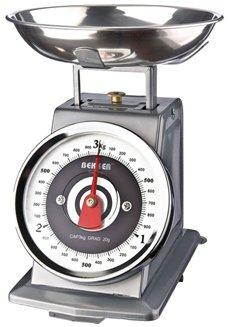
The measuring principle is based on the pressure exerted by the weight of the product to be measured on a calibrated spring. They do not have any complex devices that break under the influence of temperature and humidity, but with constant use, the spring can deform. This leads to a decrease in accuracy at the camber from 25 to 50 g. So if you need more accurate data, it is better to choose an electronic device.
Mechanical scales have a well-deserved high reputation and a long service life. They can be hand-held and bench-top. The former are suitable for an approximate result, mainly if kilograms are weighed. The latter occupy a certain area in width, length and height and are usually equipped with a bowl into which bulk products, fruits and berries or vegetables are poured.
Housewives prefer a scale of up to 5 kilograms, but if it is necessary to weigh, for example, fruits and berries for jam, then you can also find 10-kilogram scales for the production of global blanks. In mechanical scales, the pointer moves on the scale using a system of levers, so it is difficult to expect them to perform automatic additional functions.
Pros:
- extreme simplicity of design, which does not require any effort in mastering and reading data;
- reliability in use and long service life;
- no need for additional devices and equipment;
- a wide range of values obtained from 50 g to ten kg;
- democratic cost, especially when compared with electronic devices.
Minuses:
- the inability to use additional functions due to a simple spring mechanism;
- not suitable if you need an extremely accurate value in grams and tenths;
- increasing error with continuous use, due to deformation of the spring device with levers.
A simple and convenient weighing device, with a reasonable cost even for people with limited financial capabilities, perfectly copes with its main purpose.
Basic parameters for choosing scales for the kitchen
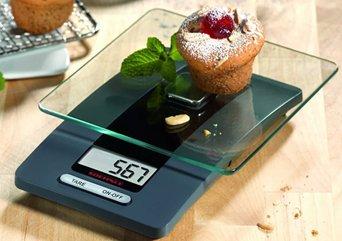
There are several important criteria that are used in the selection of such products from a wide range of industrial lines. However, it is possible to distribute confident recommendations only on condition that the consumer has his own concepts and needs, which they intend to implement with the help of a measuring device.
Someone is going to cook complex dishes and mix spices in the proper proportion, he will need more accurate parameters obtained during work. Sugar and berries for jam can be perfectly weighed with a mechanical balance, even if the error reaches a hundred-gram mark.
That is why the attention of a potential buyer should be focused on the most necessary functions and if there are additional ones, they cannot be the main purpose of the purchase, this is only a pleasant bonus to the main purpose.
Design features of the device
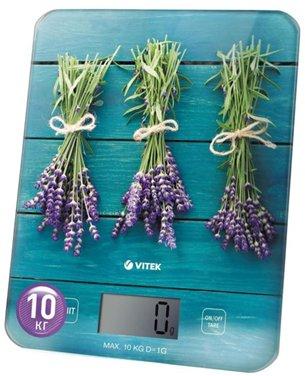
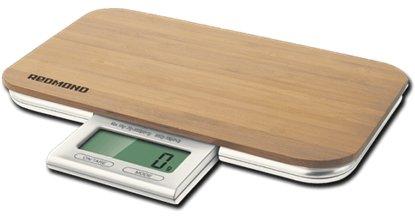
They differ in electronic and mechanical devices. The most common shape in the older variety is the bowl and platform. In the first case, it is very convenient to weigh bulk products, berries, fruits and vegetables, and the platform allows you to weigh poultry and fish. Electronic scales can be found in a cutting board, a spoon and in a measuring cup, but this requires a certain skill and in the end it will be just another item in the kitchen, only with an additional option. Scales that are built into the countertop near the stove or in the working triangle of the functional room are good in order to save the housewife's time.
There must be a permanent place for mechanical scales, especially if weighing is done daily. But even with rare use, you will have to find a place in a cabinet or wall.
Manufacturing material and design
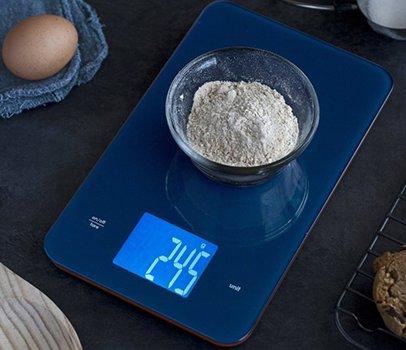
For many buyers, it is the material from which the device is made that is the main criterion for reliability and quality. Plastic significantly reduces the cost of the product, but it quickly deteriorates if a large amount is constantly weighed. The steel panel, body and bowl will cost more, but it has practically no tensile strength.
Eco-conscious advocates can purchase wood or glass equipment. However, the simplicity of glass care and its hygiene do not exclude destruction during careless use. Wet or juicy products must not be weighed on wooden elements, because this quickly deforms them and becomes unusable. You will have to adapt other dishes or kitchen utensils.
Industrial designers from leading manufacturers have developed a huge variety of solutions to meet the needs of the style matching of kitchen furniture, other household appliances, textiles and decorative decorations.
Type of battery used (for electronic)
Battery power has its prerogatives and disadvantages: they have to be changed from time to time, and the more additional functions there are in the device, the faster they need to be replaced. The modern indicator with a liquid crystal cell runs on a lithium battery, which normally lasts for 12 months. The improved system turns off immediately after the cessation of actions; there are also those that turn on independently as soon as the measurement manipulations begin.
Additional functions (for electronics)
You should not buy additional equipment that has no practical value. It only complicates the main function and uses up battery power faster. It is difficult to imagine the urgent need for a thermometer, weather sensor or alarm clock built into an electronic scale, but it can be made an object of preference:
- the ability to immediately discard the weight of the container in which weighing is performed;
- sequential weighing, in which the result is entered into the memory of the measuring device, and the result is the total weight;
- automatic on and off, saving energy and cooking time for using the device;
- conversion to other units of measurement - for those who like to cook exotic dishes from foreign sources;
- automatic calculation of useful and harmful components in food - for those who follow a diet by occupation or need.
It is clear that the more useful functions the device contains, the higher its cost. The most famous and advanced brands, which are well-praised by customers, also do not really care about price minimization, but they guarantee the quality and reliability of Supra, Zelmer, Rolsen, Polaris, Vitek.
Which kitchen scales to choose
In the developed variety of the industrial line, it is difficult to distribute didactic recommendations, but a few tips for choosing can still be voiced. An ideal option for annual harvesting for the winter would be a mechanical scale with a capacity of 5 kg and graduations of 0 g - this will allow weighing not only raw materials, but also spices for making marinades. For daily culinary rituals, you can purchase an electronic scale with the necessary functions. In this case, it is better to take a scale with automatic switching on and off and zeroing the tare.
The scale spoon is useful for those who are sensitive to the dosage of spices, and also for the owners of a small kitchen in which there is very little space. A dietary computer is the most expensive, and if there is no special need for it, like athletes, patients or art workers, you can get by with much less money to purchase a device that seemed to the owners the most necessary attribute.

